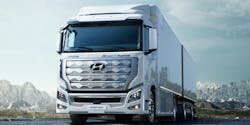Hyundai to Sell Hydrogen-Powered Trucks Stateside in 2022
Hyundai Motor Co. recently announced plans to sell hydrogen fuel cell-powered trucks in the United States by 2022.
The Seoul-based auto manufacturer said the U.S. rollout of the trucks would begin with an initial pilot program in California in 2021. The U.S. rollout will add to Hyundai’s current hydrogen-truck operations in Switzerland, where 10 of the Xcient Fuel Cell Trucks were recently shipped.
Hyundai, in a conference call held September 15, said it planned to ship 50 units by this year and increase production to 1,600 by 2025. Details of the call were reported by JoongAng Daily, an English-language daily published by one of South Korea's largest newspapers. In order to mitigate a prominent weakness of hydrogen-powered vehicles, Hyundai plans to sell the trucks to large clients that operate fleets of between 3,000 to 5,000 trucks—such clients usually run their vehicles on set routes, which should reduce the burden to Hyundai of building charging infrastructure for the vehicles.
Hyundai’s latest announcement on its entrance to the U.S. hydrogen-truck market also comes on the heels of trouble for Nikola Co., which is reportedly under investigation after a short-seller accused the company of misrepresenting its technology to investors. A Nikola board member has asserted that
Hydrogen-powered trucks, although dismissed by electric-vehicle tycoon Elon Musk, is an increasingly-populated area in changing automotive landscape.
While Hyundai reportedly called Toyota its strongest competitor on the hydrogen-mobility scene, Nikola also seeks to leave its stake in the hydrogen-powered truck market. Nikola also recently cut a partnership deal with General Motors Co. that saw the more established automaker take an 11% stake in the former and agree to help manufacture its electric pickups and hydrogen tractor-trailers.
One advantage fuel-cell-powered trucks have over those powered purely by electricity stored in batteries is weight. While one area of keen focus in battery research and development is devoted to making batteries weigh less, fuel-cell trucks can convert stored hydrogen—the lightest gas in the universe—into electricity and water vapor on the road. But they face a substantial hurdle in the limited availability of hydrogen refueling stations.
This article has been updated.
About the Author
IW Staff
Find contact information for the IndustryWeek staff: Contact IndustryWeek
